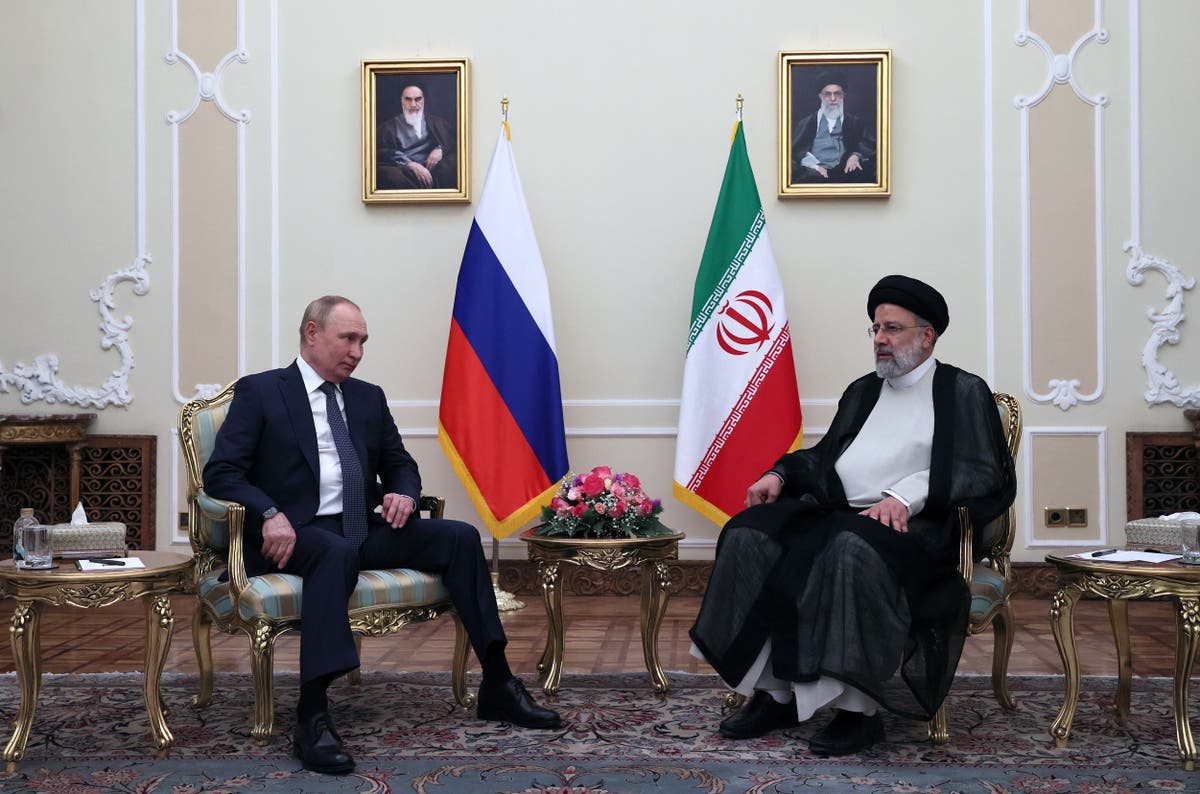Russia’s Vladimir Putin arrives in Tehran for meetings with Iran and Turkey

For free real time breaking news alerts sent straight to your inbox sign up to our breaking news emails Sign up to our free breaking news emails Please enter a valid email address Please enter a valid email address SIGN UP I would like to be emailed about offers, events and updates from The Independent. Read our privacy notice Thanks for signing up to the
Breaking News email
A Russian president so allegedly concerned about Covid that he meets with world leaders only across massive tables in cavernous rooms arrived in Tehran on Tuesday seemingly oblivious to the pandemic, which has recently surged in Iran.
Vladimir Putin arrived in the Iranian capital on only his second trip abroad since his 24 February invasion of Ukraine, which has reshaped priorities across the world and spurred several global crises, including spikes in fuel and food prices.
Neither he, his security detail nor the Iranian officials greeting them were masked or practised social distancing, despite a rise in coronavirus infections in Iran that has prompted some districts to impose both indoor and outdoor mask mandates.
He was photographed sitting a metre away from Iran’s president, Ebrahim Raissi, who was seated across a small coffee table adorned with what appeared to be a bouquet of plastic flowers.
“I am very pleased to be in the hospitable Iranian land among our friends,” Mr Putin said, according to remarks broadcast by Russian state television.
“We can boast record figures from the point of view of growth in trade; we are strengthening our interaction on issues of international security; we are making a significant contribution to the settlement of the Syria crisis.”
Mr Putin was also set to meet Iran’s supreme leader, Ali Khamenei, and Turkish president Recep Tayyip Erdogan for a summit where Eurasian and Middle East powers were to discuss the ongoing war in Syria, a possible mechanism for exporting eastern European grain through Black Sea battle lines and other regional security matters.
Few substantive details have been publicly disclosed about the talks. Mr Erdogan arrived late Monday, and he was photographed meeting with both Mr Raissi and Mr Khamenei, Iran’s top political, military and religious authority.
At a brief press conference, Mr Erdogan announced that Iran and Turkey were united in confronting “terrorism,” a reference to the Kurdish-led forces in northern Syria that Turkey is seeking to militarily dislodge with the acquiescence of Moscow and Tehran, which are the Damascus regime’s primary patrons.
“As you know, we have these groups designated on the Nato’s list of terrorist organisations,” Mr Erdogan said, referring to groups affiliated with the outlawed Kurdistan Workers’ Party (PKK), which has been fighting a decades-long war against Turkey. “We need to maintain the fight against those [organisations] in solidarity.”.
Mr Khamenei was quoted as opposing any new Turkish military offensive in Syria. “Any military attack on northern Syria will certainly be detrimental to Turkey, Syria and the whole region, and will benefit the terrorists,” he reportedly said.
Alexander Lavrentyev, the Kremlin’s pointman on Syria, was quoted by Tass news agency as saying Russia “is making efforts to convince the Turkish leadership not to resort to forceful solutions”.
Mr Putin was greeted on the tarmac of Tehran’s Mehrabad airport by Iranian Oil minister Javad Owji, before stepping into a limousine and driving off with little fanfare.
Tehran has grumbled that Mr Putin only visits Iran as part of multilateral summits rather than official state visits, part of what analysts suspect has been an effort by Moscow to keep Iran at arms length.
But recent events have driven the countries closer together. The United States is attempting to put pressure on Iran over its nuclear programme and on Russia over its invasion of Ukraine. American officials have warned that Russia was on the cusp of purchasing hundreds of Iranian combat drones to deploy in Ukraine.
Among Turkey’s aims at the summit is to further bolster itself as a transit point for Ukrainian and Russian grain exports. Western leaders and United Nations officials who have Ankara’s ear have urged Turkey to use its constructive ties with both Russia and Ukraine to hammer out a mechanism to get food out of eastern European farmlands through the straits of Bosphorus and Dardanelles to the wider world.
The three leaders were scheduled to hold several meetings and attend a state dinner, as well as hold a joint press conference.






